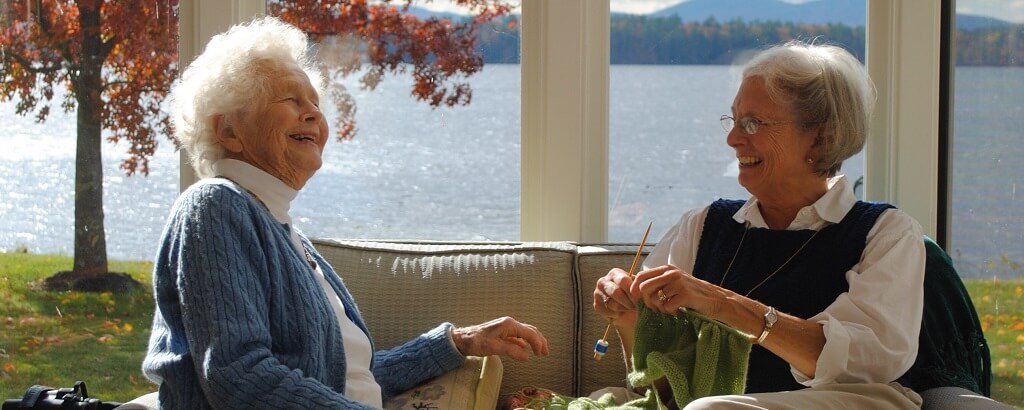Most people will experience loneliness at some point in their life. 1.4 million older people in the UK describe themselves as lonely. Loneliness has been linked to higher blood pressure and depression, and an increased risk of dementia and Alzheimer’s disease. Here we suggest practical ways of fighting loneliness and how to connect with others.
What Causes Loneliness?
There are different reasons why you might be feeling lonely. You may have lost a loved one, moved away from friends and family, or no longer experience the social contact and amusement you used to get from work. Health problems that make it difficult for you to go out and do the things you enjoy could also be a cause. There might not be any clear reason at all to explain how you’re feeling, and that’s fine too.
One of the strangest things about loneliness is that you can still feel lonely even if you’re surrounded by other people. Therefore, fighting loneliness can be different for everyone.
Activities for Fighting Loneliness
Here are 9 ideas you can try to help you feel less lonely.
1. Take up a new hobby – Retirement is a good time to pick up old hobbies again, or even new ones. Getting involved with hobbies can also help you make friends with common interests.
2. Volunteer for a good cause – Know a charity or organisation that needs your support? This idea can be a great opportunity to get out of the house, meet new people, and feel useful.
3. Get into books – If you enjoy a good read, you may enjoy being part of a book club. It can be stimulating and fun to discuss books with like-minded people. This makes it an effective means of fighting loneliness. You could ask your local council or librarian if they know of any existing book clubs.
4. Gardening – It’s a great way of getting out of the house, getting fresh air and exercise whilst experiencing the joy of growing your own flowers and vegetables. If you don’t have your own garden, you can apply through the council for an allotment. These are normally grouped together, so you can meet fellow gardeners.
5. Board games – Board games are a fun way to interact with people. From Scrabble to Monopoly, Ludo, or a good puzzle, you can enjoy a good board game at any age. Some areas may even host board game clubs.
6. Go to the cinema – Most of the big cinemas have special screenings for older people at discounted rates.
7. Keep in contact online – If your family and friends live far away from you, or you can’t meet up with them, use apps such as Facetime, Zoom, or Skype. These allow you to video call someone for free, letting you see them when you talk. As long as you both have internet access then you can call them wherever they are in the world, making this an essential tool for fighting loneliness.
8. Team sports – Team sports are a great way to meet people on a regular basis. They don’t have to be too strenuous, either. For example, boules, bowling, walking football, snooker, and table tennis are all great options.
9. Meditation and/or Yoga – Both are simple techniques that can improve a negative mood and reduce stress. They can help you feel more at peace, which helps with fighting loneliness by putting you in a more positive frame of mind.
Recognising Loneliness
Everyone can feel lonely, and you don’t necessarily need a reason to feel like this. Sometimes it might even be just a passing thought or feeling. Sometimes there may be a reason and sometimes there might not.
Knowing what can affect your mental wellbeing might help you understand the emotions you’re having and help you think about the steps you can take to look after yourself. Identifying the causes of your loneliness can be the best place to start.
Although it’s hard, and sometimes there might not be a reason, it’s a good idea to think about what is making you lonely. It might help you try and find a way of feeling better. For example, you could try keeping a notebook aside to jot down any feelings, thoughts, and emotions you are experiencing. This can help you identify patterns that may be triggering your emotions.
Loneliness can have a big impact on our mental wellbeing. Being lonely can often leave you feeling worried, low, out of sorts, or just off. It is very normal for everyone to have an “off day”, but these are signs you’re not feeling as well as you could be. Talking is often the best way to start fighting loneliness and feeling better. That could be with a family member, your doctor or nurse, a neighbour – whoever you feel comfortable with.
Reassurance at Home from Carelink24
Sometimes, you may feel lonely because you need extra reassurance at home. If you are living alone, you may worry that there is no one around to help if you have a fall or feel unwell. This can increase feelings of loneliness.
With a personal alarm, help is always the press of a button away. When you activate your alarm, an alert is sent to our in-house Care Team. They will arrange help on your behalf by informing emergency contacts or, if necessary, the emergency services.
You can find out more about the Carelink24 personal alarm service by reading our quick guide or viewing our products. If you have any further questions about our service or products, please do not hesitate to get in touch. Call on 0800 0076 247 to speak to our friendly team.
Editor’s Note: This article was updated on 29th January 2024.


